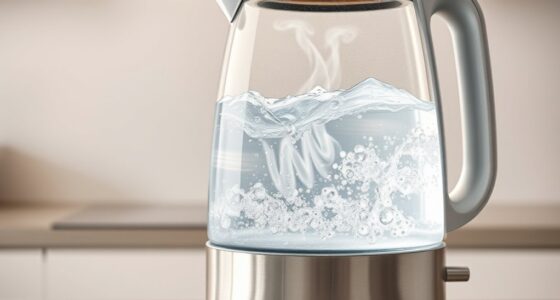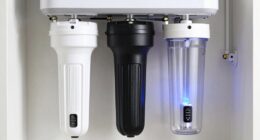When you're deciding between gas and electric dryers, consider a few key differences. Gas dryers typically dry clothes faster and have lower operating costs, especially in areas with cheap gas. They do require proper ventilation and maintenance. On the other hand, electric dryers are easier to install and often have lower upfront costs. However, they may lead to higher energy bills. By weighing these factors, you can decide which option best suits your needs and budget. There's plenty more to uncover about features and long-term savings, so stick around to find out what else you should consider.
Key Takeaways
- Gas dryers typically offer faster drying times and lower operating costs due to cheaper gas rates compared to electric dryers.
- Electric dryers are generally easier to install and have lower upfront costs, making them popular in homes without gas lines.
- Maintenance for gas dryers requires more attention due to combustion components and ventilation needs, while electric dryers have simpler maintenance.
- Gas dryers have a longer lifespan (about 13 years) compared to electric dryers (around 14 years), impacting overall cost of ownership.
- Both types require proper ventilation; gas dryers need metal ducting for safety, whereas electric dryers require adequate space for venting.
Types of Dryers
When it comes to dryers, you have several options to choose from, each with its own benefits. Gas dryers use natural gas or propane for heat, which often results in faster drying times and lower operating costs. If you're looking for efficiency, gas models typically outperform electric ones in that department.
However, electric dryers, which operate on a 240-volt current, are usually easier to install, especially in homes without gas lines, making them a go-to for many.
For those short on space, washer dryer combos are a great solution, combining washing and drying functions in a single unit. If you're tech-savvy, consider smart dryers. These models come with Wi-Fi connectivity, allowing you to monitor and control your laundry remotely, adding convenience to your routine.
While choosing your dryer, keep in mind installation costs and safety concerns, as gas models require proper ventilation. Maintenance and repair can also differ; gas dryers generally need more attention due to the combustion components.
Ultimately, your choice will depend on your space, budget, and personal preferences.
Cost Analysis

When you're weighing the costs of gas versus electric dryers, the initial purchase price plays a big role.
While electric dryers might seem like the budget-friendly option upfront, gas dryers can save you money in the long run with their lower operating costs.
Understanding these factors helps you make a smart long-term investment for your laundry needs.
Initial Purchase Price
The initial purchase price is an essential factor to take into consideration when choosing between gas and electric dryers. Typically, electric dryers have a lower upfront cost, often priced around $100 less than gas dryers. This price difference is largely due to the fewer installation requirements associated with electric models.
On average, you can expect to pay between $500 and $1,200 for an electric dryer, while gas dryers generally range from $600 to $1,300.
However, it's important to take into account that gas dryers have additional installation requirements, including a gas hookup and proper venting, which can increase the upfront cost. While you might save money initially with electric dryers, gas dryers can lead to lower operational costs, particularly if your home already has existing gas lines.
When evaluating the total cost of ownership, including installation and operating expenses, gas dryers may prove to be more economical over time despite their higher initial purchase price.
Operating Cost Comparison
Understanding the operating costs of gas versus electric dryers can greatly impact your decision. Gas dryers typically have lower average operating costs, mainly because gas prices tend to be cheaper in many areas.
While you might notice that gas dryers have a higher initial purchase price—averaging about $100 more than electric models—the long-term energy savings can help offset this difference within a few years. Additionally, businesses benefiting from merchant account credit processing may find that the financial aspects of selecting appliances like dryers can be streamlined with effective cash flow management.
One of the key factors contributing to the operating costs is efficiency. Gas dryers often boast faster drying times, which means they consume less energy overall. However, it's vital to take into account local pricing and regional energy rates, as these can considerably influence the overall operational costs of both gas and electric dryers.
On average, the total cost of ownership for gas dryers can be lower over time, especially if your home already has gas hookups. By weighing these factors, including efficiency and energy savings, you can make a more informed choice that suits your needs and budget.
Long-Term Investment Value
Evaluating the long-term investment value of gas versus electric dryers is crucial for making a smart purchase.
Gas dryers usually have a higher initial purchase price, averaging about $100 more than electric dryers due to the need for gas line installations. However, they often lead to lower long-term operating costs because gas rates are typically cheaper than electricity. This can result in significant savings over time.
When analyzing the total cost of ownership, you should consider your local energy rates, as they can greatly impact your utility expenses.
While gas dryers tend to last around 13 years and electric dryers about 14 years, both require regular maintenance to guarantee peak performance and longevity.
Understanding the long-term investment value involves looking beyond the initial purchase. Calculate your potential utility expenses and factor in maintenance costs to determine which option is more cost-effective for your laundry needs.
In many cases, despite the higher upfront cost, gas dryers can offer a better return on investment due to their lower operating costs over time.
Efficiency Comparison

When comparing gas and electric dryers, efficiency plays a crucial role in your decision-making process. Gas dryers often outshine electric dryers regarding energy efficiency due to their quicker drying times. They operate at a higher BTU output, allowing them to dry a load of laundry much faster. This means you spend less time running the dryer, which can lead to lower utility bills, especially if you have access to affordable natural gas.
On the other hand, electric dryers usually require more energy to reach ideal temperatures, resulting in longer drying times and higher electricity consumption. This can quickly add up in your monthly costs, impacting your overall budget.
If you're looking for cost savings, consider that ENERGY STAR-rated gas dryers meet strict energy efficiency guidelines set by the EPA and DOE, enhancing your savings even further.
While installation costs may vary between the two types, the long-term benefits of gas dryers' efficiency often prove advantageous. Ultimately, choosing a gas dryer can lead to significant energy savings and a more efficient laundry routine.
Installation Requirements

Installing a dryer involves specific requirements that vary between gas and electric models. Understanding these installation requirements is vital for guaranteeing safety and energy efficiency. Here's a quick comparison:
| Feature | Gas Dryers | Electric Dryers |
|---|---|---|
| Power Source | Dedicated gas line | 240-volt outlet |
| Electrical Requirement | 120-volt outlet | 240-volt outlet |
| Ventilation | Proper ventilation with metal ducting | Adequate space for venting |
For gas dryers, you'll need a dedicated gas line and a 120-volt electrical outlet. Don't forget that proper ventilation is important to prevent gas leaks, which is why professional installation is often recommended. Local codes may restrict where you can install gas dryers, so check your area's regulations before proceeding.
On the other hand, electric dryers simplify the installation process since they don't require a gas hookup. They need a 240-volt outlet, larger than standard outlets. Both dryer types require adequate space for ventilation, but gas dryers typically need additional clearance. By following these installation guidelines, you can guarantee your dryer operates safely and efficiently.
Safety Considerations

Safety is a top priority when using dryers, whether gas or electric. Each type has specific safety considerations that you should keep in mind to avoid potential hazards.
For gas dryers, it's vital to guarantee secure gas lines and use only rigid metal venting to prevent issues like gas leaks and carbon monoxide buildup. Installing a carbon monoxide detector in your home can provide an additional layer of safety.
Additionally, maintaining proper airflow is fundamental for both types of dryers; for instance, using air purifiers can help improve indoor air quality by reducing lint and other pollutants in the environment, contributing to a safer dryer operation effective reduction of allergens.
On the other hand, electric dryers require proper wiring to avoid electrical hazards.
Regular duct cleaning is fundamental for both types to prevent lint buildup, which can lead to fire hazards.
Here are some key safety tips to keep in mind:
- Always use metal venting for gas dryers to enhance ventilation.
- Install a carbon monoxide detector if you have a gas dryer.
- Guarantee proper wiring for electric dryers to prevent electrical issues.
- Regularly clean ducts to minimize fire hazards.
- Familiarize yourself with dryer operation and troubleshooting to spot safety hazards promptly.
Maintenance Tips

Proper dryer maintenance is essential for keeping your appliance running efficiently and safely. Regular upkeep not only enhances performance but also minimizes safety hazards. Here are some key maintenance tips for both gas and electric dryers:
| Task | Frequency | Importance |
|---|---|---|
| Clean the lint filter | After every load | Improves airflow and reduces fire risk |
| Vacuum lint filter compartment | 2-3 times a year | Prevents lint buildup and enhances safety |
| Schedule professional cleaning | Annually | Guarantees proper dryer venting and airflow |
| Inspect electrical wiring (electric dryers) | Every few months | Prevents electrical issues and guarantees safe operation |
For gas dryers, always guarantee that venting systems use rigid metal ducts instead of plastic or foil. This not only prevents gas leaks but also improves safety. If you notice any issues with airflow or performance, consider consulting a professional for a more thorough inspection. By following these maintenance tips, you can prolong the life of your dryer and keep it running safely and efficiently.
Popular Models and Features

When choosing a dryer, you'll want to explore some of the top models available.
From the high-tech features of the Samsung and LG electric dryers to the budget-friendly Whirlpool option, there's something for everyone.
Let's compare their key features and price ranges to help you find the right fit for your laundry needs.
Top Models Overview
Choosing the right dryer can greatly impact your laundry routine, and exploring popular models can help you make a more informed decision.
Here's a quick overview of some top options:
- Samsung Electric Dryer – DVE45R6100: Priced at $1,049.00, this model is known for its advanced drying options and smart technology, which enhances convenience and efficiency.
- LG Smart Electric Dryer – DLEX7800: With a similar rating of 3.8, this dryer costs $1,149.00 and features Wi-Fi connectivity, allowing you to monitor and control it remotely.
- Whirlpool Electric Dryer – WED5000DW: A budget-friendly choice at $749.00, this model boasts a 3.9 rating, highlighting its reliable performance and user-friendly features.
- Energy Efficiency: Many modern dryers, including these popular models, come equipped with moisture sensors to prevent over-drying and enhance energy efficiency.
- Top-Loading Dryers: Whirlpool's models provide easy access for loading and unloading, making them ideal for users who prioritize convenience in their laundry routine.
Key Features Comparison
In today's laundry landscape, understanding the key features of popular dryer models can greatly influence your decision. When comparing gas vs. electric dryers, consider performance and efficiency.
For instance, electric dryers like the Samsung Electric Dryer DVE45R6100 and LG Smart Electric Dryer DLEX7800 are well-rated for reliability, while the Whirlpool Electric Dryer WED5000DW offers a budget-friendly option without compromising on quality.
One of the main advantages of gas dryers is their faster drying times, thanks to higher BTU output. This not only saves time but can also be more energy efficient in the long run.
On the other hand, electric models often come loaded with features such as multiple cycles and energy-efficient technologies, including moisture sensors. These sensors help prevent over-drying, reducing energy consumption and extending the life of your clothes.
Installation costs can vary considerably between gas and electric models, with gas dryers typically requiring additional venting and connections.
Ultimately, your choice should reflect your laundry needs, budget, and preferences regarding key features, such as drying times and energy efficiency.
Price Range Insights
Understanding the price range of gas and electric dryers helps you make a more informed decision that aligns with your budget and laundry needs.
When you're evaluating options, consider both the initial purchase price and the long-term operating costs.
Here are some key points to keep in mind:
- Electric Dryers: Models like the Whirlpool Electric Dryer (MSRP: $749) are budget-friendly, while advanced models like the LG Smart Electric Dryer and Samsung Electric Dryer range from $1,049 to $1,149.
- Gas Dryers: Typically, these come with a higher initial purchase price, often about $100 more due to installation costs. However, they can be more energy efficient, leading to lower utility expenses over time.
- Affordability: Electric dryers usually provide a more affordable upfront option, but gas dryers may save you money in the long run.
- Advanced Features: Look for models that offer features that suit your needs, as these can impact your overall satisfaction.
- Utility Expenses: Always factor in your local energy rates when considering operating costs.
Frequently Asked Questions
What Is Better, a Gas or an Electric Dryer?
When deciding between a gas or electric dryer, consider your budget, installation options, and laundry needs. Gas dryers often dry faster and might save you money long-term, while electric models are generally easier to maintain.
What Are the Disadvantages of a Gas Dryer?
If you live in an apartment without gas hookups, you might struggle to find a gas dryer. Additionally, their higher costs, noise, and safety concerns like gas leaks can make them less appealing for some users.
Can You Use an Electric Dryer if You Have a Gas Hookup?
Yes, you can use an electric dryer if you have a gas hookup. Just make sure you've got the right 240-volt outlet installed. Your choice depends on your laundry needs and installation preferences.
Do Electric Dryers Need to Be Vented?
Yes, electric dryers need to be vented to expel moisture and lint. Proper venting prevents mold and fire hazards, so make certain you have a suitable duct system in place for safe and efficient operation.
Conclusion
In the epic showdown between gas and electric dryers, choosing the right one can feel like deciding between a roaring lion and a gentle lamb! Imagine this: a gas dryer blasting your clothes dry in a mere blink, while an electric one hums softly, wrapping them in warmth. Ultimately, your choice can turn laundry day from a chore into a thrilling adventure! So, weigh your options wisely, and release the laundry hero within you!









